Trump Continues To Drive A Wedge Between The United States And Its Allies
Donald Trump continues to do something that Russian and Soviet leaders likely only thought possible in their wildest dreams, drive a wedge between the United States and its NATO allies.
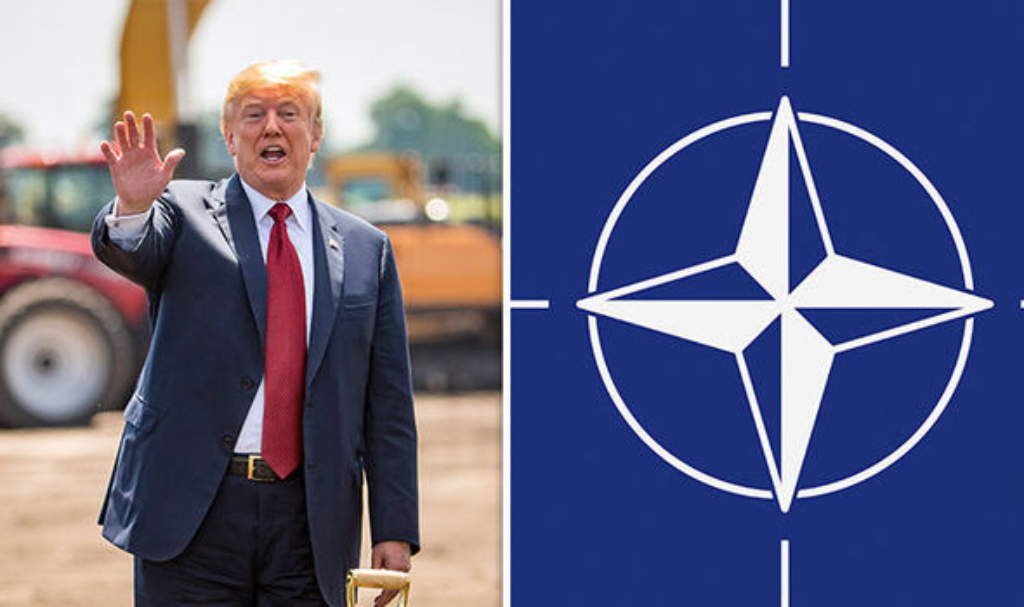
The New York Times reports that President Trump recently sent letters to leaders of most if not all of the members of NATO berating them for not living up to a commitment to increase their military spending:
WASHINGTON — President Trump has written sharply worded letters to the leaders of several NATO allies — including Germany, Belgium, Norway and Canada — taking them to task for spending too little on their own defense and warning that the United States is losing patience with what he said was their failure to meet security obligations shared by the alliance.
The letters, sent in June, are the latest sign of acrimony between Mr. Trump and American allies as he heads to a NATO summit meeting next week in Brussels that will be a closely watched test of the president’s commitment to the alliance. Mr. Trump has repeatedly questioned its value and has claimed that its members are taking advantage of the United States.
Mr. Trump’s criticism raised the prospect of another confrontation involving the president and American allies after a blowup by Mr. Trump at the Group of 7 gathering last month in Quebec, and increased concerns that far from projecting solidarity in the face of threats from Russia, the meeting will highlight divisions within the alliance. Such a result could play into the hands of President Vladimir V. Putin of Russia, who is to meet with Mr. Trump in Helsinki, Finland, after the NATO meeting, and whose primary goal is sowing divisions within the alliance.
In his letters, the president hinted that after more than a year of public and private complaints that allies have not done enough to share the burden of collective defense, he may be considering a response, including adjusting the United States’ military presence around the world.
As we discussed during your visit in April, there is growing frustration in the United States that some allies have not stepped up as promised,” Mr. Trump wrote to Chancellor Angela Merkel of Germany in a particularly pointed letter, according to someone who saw it and shared excerpts with The New York Times. “The United States continues to devote more resources to the defense of Europe when the Continent’s economy, including Germany’s, are doing well and security challenges abound. This is no longer sustainable for us.”
“Growing frustration,” Mr. Trump wrote, “is not confined to our executive branch. The United States Congress is concerned, as well.”
The president’s complaint is that many NATO allies are not living up to the commitment they made at their Wales summit meeting in 2014 to spend 2 percent of their gross domestic product on national defense. American presidents have long complained about the lack of burden-sharing by NATO member countries, but Mr. Trump has taken that criticism much further, claiming that some of the United States’ closest allies are essentially deadbeats who have failed to pay debts to the organization, a fundamental misunderstanding of how it functions.
The Trump administration has already reportedly been analyzing a large-scale withdrawal of American forces from Germany, after Mr. Trump expressed surprise that 35,000 active-duty troops are stationed there and complained that NATO countries were not contributing enough to the alliance.
In the letter, Mr. Trump told Ms. Merkel that Germany also deserves blame for the failure of other NATO countries to spend enough: “Continued German underspending on defense undermines the security of the alliance and provides validation for other allies that also do not plan to meet their military spending commitments, because others see you as a role model.”
In language that is echoed in his letters to the leaders of other countries — including Prime Minister Justin Trudeau of Canada, Prime Minister Erna Solberg of Norway and Prime Minister Charles Michel of Belgium — Mr. Trump said he understands the “domestic political pressure” brought to bear by opponents of boosting military expenditures, noting that he has expended “considerable political capital to increase our own military spending.”
“It will, however, become increasingly difficult to justify to American citizens why some countries do not share NATO’s collective security burden while American soldiers continue to sacrifice their lives overseas or come home gravely wounded,” Mr. Trump wrote to Ms. Merkel.
Mr. Michel reacted tartly last week to the letter, telling reporters at a European Union summit meeting in Brussels that he was “not very impressed” by it, according to a report by Deutsche Welle.
Mr. Trump has long complained about the alliance and routinely grouses that the United States is treated shabbily by multilateral organizations of which it is a member, be it the World Trade Organization or the North Atlantic alliance. But in Europe, the letters to NATO allies have been greeted with some degree of alarm because of their suggestion that Mr. Trump is prepared to impose consequences on the allies — as he has done in an escalating tariff fight with European trading partners — if they do not do what he is asking.
“Trump still seems to think that NATO is like a club that you owe dues to, or some sort of protection racket where the U.S. is doing all the work protecting all these deadbeat Europeans while they’re sitting around on vacation, and now he is suggesting there are consequences,” said Derek Chollet, a former Defense Department official who is the executive vice president for security and defense policy at the German Marshall Fund of the United States.
“Europeans have been watching Donald Trump begin to implement his rhetoric on trade in ways that are very combative,” he said, “and they’re starting to contemplate whether he would do this regarding security issues, as well.”
This letter is just the latest example of the President’s rather obvious disdain, and what seems to be his fundamental misunderstanding of what the 2% spending goal that was agreed to at the 2014 NATO Summit is all about. First of all, it’s important to note that this spending requirement is not part of the NATO Treaty itself and was never intended to be. Instead, it was meant to address the concerns that American Administrations have had in the past that the United States was bearing a disproportionate share of the burden when it came to defense spending focused on the alliance itself. As a result, the members at the time agreed to a goal that each member would spend roughly 2% of their Gross Domestic Product on defense, or at least make their best efforts to do so. It was never intended that this goal would be a cost of membership or that there would be any kind of punishment for failing to meet this goal. Additionally, it was also understood that, in some cases, exceptions would be made. Iceland, for example, does not even have a standing military to spend money on, but instead, it contributes financially to the alliance as best it can in addition to providing an important mid-Atlantic base for American and other naval forces.
Based on his rhetoric as both President and as a candidate, though, it seems clear that President Trump either doesn’t understand the nature of the NATO alliance and the purpose of the 2% goal, or he doesn’t care and is simply using this as an excuse to continue his habit of bashing our closest allies while at the same time cozying up to the leaders of antagonistic authoritarian regimes such as Russia and China. Judging by his rhetoric and by the apparent content of these letters to NATO leaders, it seems clear that Trump sees the 2% goal as some sort of membership fee that every nation is supposed to be paying to be part of the alliance and he also seems to believe that, rather than being spent on domestic defense, the money is supposed to be going to some kind of NATO central fund that quite simply doesn’t exist. It’s unclear if Trump actually believes this, or if he deliberately shades his rhetoric to falsely characterize the goal in this manner. In the end, it hardly matters which one is true though since the impact of Trump’s rhetoric and this letter is the same.
In addition to not understanding, or deliberately misstating, what the defense spending goal is all about, it also seems clear that Trump does not understand what the NATO alliance is all about or the value that it provides to the United States merely because of its existence. In addition to the fact that it has helped keep the peace in Europe since the end of the Second World War, although it’s also the case that the U.S. nuclear deterrent has gone a long way toward accomplishing that goal in any case. Additionally, the alliance and the American presence in Europe serve several important purposes for the United States and the rest of Europe. The primary purpose, of course, is the role it has played in checking Soviet and now Russian adventurism in Europe over the past seven decades, but its role goes far beyond that. The air, land, and sea bases that the United States is able to take advantage of in Europe thanks to the alliance have proven to be advantageous both in moving men and material during the Persian Gulf War, the war in Afghanistan, and the Iraq War and therefore have saved money and time in terms of transportation and other costs. Similarly, military hospitals in places such as Germany have been essential in treating wounded soldiers from those and other conflicts. Finally, it’s worth noting that the alliances collective defense provision has only been invoked once in the alliance’s history, in the wake of the September 11th attacks. As a result of that, NATO members have contributed personnel, material, and financial support to the fight against al Qaeda and other terrorist organizations and their soldiers have fought alongside American troops in Afghanistan and elsewhere for the past seventeen years. For the President to trash them now is both short-sighted and stupid.
The fact that this report comes just a week before the President is set to travel to Europe for the NATO summit in Brussels as well as a trip to the United Kingdom and a summit meeting with Vladimir Putin in Helsinki, Finland is obviously concerning. Most notably, of course, it raises the prospect that he will act much the same manner that he did at the G-7 Summit in Canada during, which he basically blew up and during which he is reported to have made several derogatory comments about NATO itself. There are also signs that the visit to the United Kingdom may not go very well, especially considering the disdain toward Trump by the majority of the British public. Much like he left the G-7 in chaos and flew to Singapore where he held a largely meaningless but yet obsequious summit meeting with North Korean leader Kim Jong Un it’s entirely possible that we’ll see Trump trash NATO both behind closed doors and in public and then turn around to have a buddy-buddy meeting with Putin. As I’ve noted before, whether it is intentional or not this President continues to do all he can to undermine America’s relationships with its most important allies, these letters are just the latest example of that. The only person besides Trump who can possibly be happy about that is Vladimir Putin himself, who is witnessing an American President do what Soviet leaders from Stalin through Gorbachev could do, drive a wedge right into the heart of the Atlantic alliance. The prospect for permanent damage gets more likely by the day.

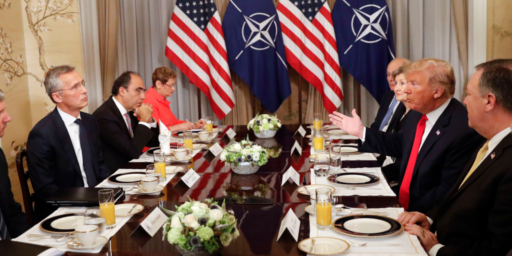
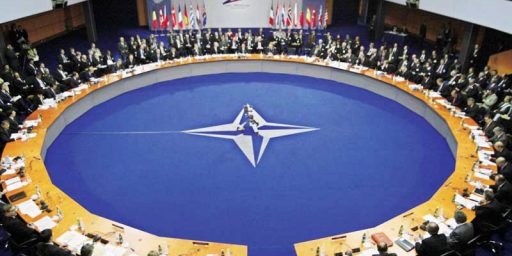

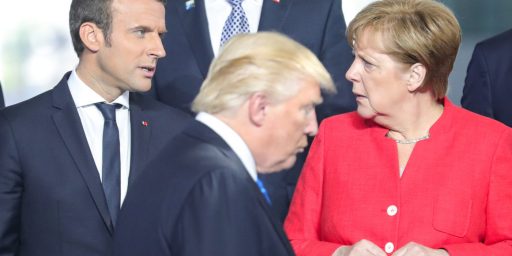
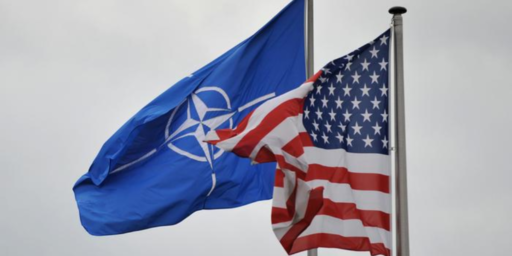
Does Trump know that American military bases in Germany serve very important American strategic interests well beyond Germany and our soon-to-be-former European friends? Germany could call Trump’s bluff by saying, “okay then, you’re free to leave. Thanks for the past 70 years.” I’m not sure it’s in our interest to give up our bases in Germany.
Honestly, he is breathtakingly arrogant and uninformed. He thinks that this is just another opportunity to show everyone that he can apply his ‘Art of The Deal’ binary-deal making ‘skills’ to multilateral agreements.
Remind me again why it was a good idea to elect an obstinate moron to any kind of office?
The 2% defense spending goal is pretty much a red herring.
Historically, the US has actively discouraged its NATO partners from developing independent military capabilities in order to create a dependency that is ultimately beneficial to the US’ strategic goals:
So maybe European countries haven’t been spending enough on defense since the end of the Cold War, in which case the US government should renegotiate (as it has) the way the overall burden is shared within NATO. No issue there.
But complaining that other countries are “profiting” from the US is bullshit. Because that’s how the deal was designed in the first place: by the US to benefit the US.
To put this in a bit more context: the EU’s GDP is getting fairly close to the GDP of the US. So if the US, in the medium term, wants to create a near-peer military adversary (instead of a bunch of dependent allies), Trump is absolutely on the right track.
NATO was created to counter the threat of the Soviet Union, a threat which no longer exists. And no, Russia with its GDP smaller than FREAKIN’ ITALY’S is in no way, shape, or form the equivalent of the old Soviet Union.
Also, I really hope you have a better argument for NATO than “it makes it easier for the U.S. to bomb anonymous brown people to death.” And yes, folks, if you want the U.S. to move away from an imperialist foreign policy that bombs anonymous brown people, re-evaluating things like NATO is a necessary part of that.
As I believe I’ve mentioned here before, the post-WWII global order was built on the U.S. bearing the burden of hegemony while foregoing many, but not all, of the prerogatives of the hegemon. That arrangement has only intensified since the end of The Cold War. If you think that can last forever, you are a moron. If you think it should last forever, you are a fool.
Mike
@drj:
The problem with that Vox article is that it’s only an arguably good deal for the U.S. as long as we maintain the economic supremacy to easily afford it.
Mike
@drj :
Bingo. We’ve wanted to be the biggest, strongest kid on for over half a century and have designed our national policies around America being Number 1. Of course it’s expensive – being the top dog usually is. Cheapening out is how Number 1 slides down to second place if they’re lucky, further behind if they are not. Trump has NEVER understood that quality and money are interconnected. Oh, he gets that expensive things tend to be better and thus blings out everything under the impression it’s classes the joint up. True quality, however, has cost as a byproduct and not a requirement.
If our allies start seriously pursuing military options to bring them to our level, yeah it means we have to spend less… on them. We’ll have to spend more at home to up our game now that there’s a new rival in town. Whatever BS Trumpkins think about saving money on this venture is utterly misguided because that money’s going right back into defense contractor pockets. It’s only going to hurt the taxpayer even more.
@drj:
It’s amazing this needs to be spelled out, but it does need to be spelled out.
Simply look at European history. Take any century at random, and there is war after war after war. The XIX Century might look atypical, but only because the wars between European powers moved to Asia and Africa. Ultimately even that collapsed and we had the monumental stupidity of WWI and WWII.
Wasn’t that enough?
Things are vastly different now. Given the EU, some European nations might join in a military alliance of their own. But tensions here would work themselves out in highly unpredictable ways.
Do we want to see a return to Balance of Power politics in Europe, with nukes and chemical and biological weapons thrown in? European history makes for fascinating reading, but much of it would have been horrible times to live in.
@MBunge”
So whom do you plan to concede that burden to knowing that also means conceding power and control? Are there plans to reduce the American military’s budget since we’re not going to have to expend resources on those allies now? You gonna be OK when China steps in to handle things and stretches their muscles? What about Germany holding all of Europe under their thumb again – sound good?
Honestly, you’re sounding like the parent who demands their “lazy” kid be emancipated at 16… only to realize once they’re out, you have no damn control anymore and you’re nobody in the eyes of the law. With great power comes great responsibility – forfeit the responsibility and watch the power go poof!
@Kathy: @Kathy:
“Remind me again why it was a good idea to elect an obstinate moron to any kind of office?”
I asked the same thing from 2009-2016.
The thing is that the European leaders know Trump is all bluster. And, in a sense, they could just weather out the next 2-6 years. But .. they can’t. Because these spats are very public and they can’t be seen to be backing down in the face of this; not if they want to be re-electing. Trump is forcing them to confront him. And this is not going to end well.
From a world-wide human rights POV, Donald Trump will actually be a better US president than GWB unless he starts a war that kills hundreds of thousands of people.
Only a rabid partisan idiot would think that Obama is a moron compared to the current occupant of the White House…
I was reflecting the other day on the amazing decline in the educational and cultural level of the people who are charged with advancing Kremlin influence in America and Europe. I was thinking mainly of the contrast between Alger Hiss and Donald Trump, say, or John Bolton. Or take Kim Philby – posh is the word.
But this bunch? Idiots and barbarians.
We should complain to Putin.
According to Bunge Russia is not a threat.
Maybe he should read the Bi-partisan Senate IC report just out this afternoon?
Interesting timing, just prior to Dennison’s summit with his boss.
@KM: Well, you know that Bungles has long held these deeply considered thoughts about how terrible NATO is — ever since he had to find ways to justify whatever nonsense came out of his hero’s mouth.
@alanstorm:
Would you like a Kool Aid? It’s the preferred beverage of supporters of the current minority-elect president. And endorsed by the Electoral College and Trump University.
@MBunge:
So, your position is that the US should–of its own accord and by its own efforts–step back from being the “global hegemon” and do so (apparently) sooner rather than later and immediately if possible? Interesting theory. You should write an article explaining it. I bet OTB would even publish it for you if no one else was interested. It truly is a revolutionary theory in Political Science.
The trumpidians complaints about Iran, which are valid, stem from Iran acting as a regional power trying to establish and dominate a sphere of influence. Going back to the Revolution in 1979 and adding the Iran-Iraq War, the spillover from that is astonishing.
Things such as the politicization of Islam (including Al Qaeda and the Islamic State), pursuit of nuclear weapons by various countries in the region, terrorism galore aimed at the West, two wars in Iraq, one in Afghanistan, revolutions all over (mostly quashed), civil wars in Syria and Lybia, etc.
Now picture much the same thing, perhaps minus religion, playing out in Europe if NATO falls apart and the various powers in the region try to assert themselves. Consider they are far wealthier than the powers in the Middle East, many of them already produce weapons, and they have a big industrial and technological base.
Things might be tempered by the EU, as well as multi-state industries like Airbus, Arianespace and others. But it only takes one ambitious state actor to screw things up for everyone else. Perhaps someone backed by a major power like Russia or China, or even the U.S.
Oh, and two European states, France and the UK, already have nukes.
Sure, let’s have all this uncertainty and chaos and possibly misery because one moron won an election and doesn’t like democracies.
Who is to say what Iran would look like today without the coup of 1953 and the Iraq Debacle…perhaps certain people would have far less to complain about…
Is there a consensus from political scientists what this new party that Trump is leading is called?
I don’t believe that most Republicans would say that what we have seen are Republican ideals. I don’t think that the Tea Party even proposed these policies.
And it sure the heck isn’t even close to the Democrats.
So these bitter, continuously angry people that get joy from burning it all down… just what IS this new party? Who is Trump really leading?
@Kathy:
Technically speaking, six European states possess nukes, although four of them – Belgium, Germany, Italy and the Netherlands – hold US owned nuclear weapons in their arsenals, but aren’t provided permissive link control. All told the number runs to about 200 or so of them in those four countries.
@Kathy: Please. Obama had a Harvard education in Constitutional Law, (so they say).
By his own admission Kim Jong Trump is well schooled in sexually molesting women and all the evidence points to his mastery of adultery by screwing porn stars.
I’m sure he surpasses all your expectations of a white man.
I guess his education is now fake news too? Trump apologists are so pathetic…
I gave Bunge an upvote; don’t hate me. NATO was spectacularly successful in countering the military threat of the USSR. The Russians are too smart to try to overcome the enemy’s main strength, and they decided to try a technological play with Sputnik in 1957 which was countered by the moon landing. The technology race was a major misstep and led to the downfall when they clearly could not keep up. They have not become pacifist, however. They look for arenas where they can win. Meddling in elections via social media hacking is their latest thing as reported by the Senate intelligence committee today. Trump should positively, forcefully make it clear to Putin that this game is over. His words must be accompanied by a genuine enlistment of our computer technology industry in this effort. NATO is a sideshow. We do have a lot of strength in tech. We should build on our strength. Military bases are a 19th century solution that has been failing in Afghanistan for the past 150 years.
@HarvardLaw92:
I din’t know that. I assume these are tactical nukes with relatively small yields.
If push comes to shove, they can be hacked in a variety of ways and made to detonate.
There was a saying some years back: “NATO was created to keep the Russians out, the Americans in, and the Germans down.” We all know Trump’s attitude toward the first of those reasons.
@MBunge: This probably sounded better in the original Russian.
The 1980s called, they want their Republican president driving a wedge between the US and its allies whine back.
@JKB:
Yes, the 1983 attack on the Marine Barracks in Beirut killed 240 American soldiers and hastened Reagan’s decision to leave Lebanon.
It is interesting that there were 5 years of Republican investigations concerning the 4 Americans who died in Benghazi, while there was one brief Democrat led investigation of the Beirut bombing.